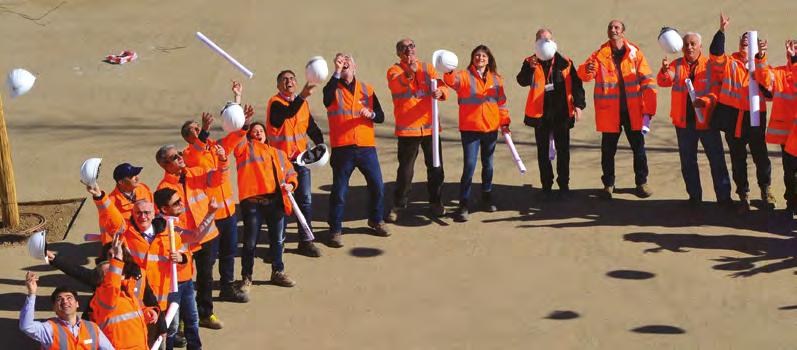
13 minute read
Recruitment and HR management
TURNOVER BY GENDER
2021 2.9%
2020 2.0%
2019 3.7%
0
Women Men 5
12.9% 10.9%
10
16.6% 13.7%
15
19.5% 15.8%
20 The turnover rate was 16.6%, compared to 12.9% in the previous year. The increase was due to the higher number of incoming employees in 2021 compared to 2020.
(102-8, 102-35, 102-36, 102-41; 201-3; 401-1, 401-2; 404-2; 405-1, 405-2)
| RECRUITMENT
2021 saw the Group advance its commitment in all talent acquisition and recruitment activities based on the principles of merit, transparency and equal opportunities, with a view to diversity and inclusion. In continuity with the promotion of professional diversification and development of the Group’s resources, each recruitment process for professional targets and middle management jobs involved a preliminary job posting, resulting in 267 processes, with over 753 positions filled for corporate and intercompany mobility. Recruiting on the market was also more innovative and digital in 2021, with a total of 1,440 recruitment processes carried out at Group level on different targets. Specifically, FS planned and ran 15 online recruiting days to recruit recent university graduates mainly as engineers, economists and legal experts. FS’ database has more than 406,000 CVs, of which 16,000 were screened for job postings. Over 124,000 candidates were pre-screened and over 23,000 underwent technical/motivational interviews. In addition, 11 assessments were made and over 700 online candidates were found, 59 of whom through the Group’s fruitful collaboration with the network of universities. In the external recruitment of professional and operational personnel, each company followed its own specific procedures while upholding the Group’s principles and guidelines.
89) The data refer to the following companies: FS Italiane S.p.A., RFI, Trenitalia, Ferservizi, Italferr, FS Sistemi Urbani, Mercitalia Logistics, Mercitalia Rail, Mercitalia Intermodal, Busitalia Veneto, Busitalia Rail Service, Busitalia Campania, Grandi Stazioni Rail, Grandi Stazioni Immobiliare, Terminali Italia, Italcertifer, Nugo, FS Technology, Cremonesi Workshop, FS International and Ferrovie del Sud-Est. The total number of employees in this scope of analysis is 62,301, approximately 76% of the Group’s total workforce.
Online recruitment was also possible thanks to the progressive roll-out of the Smart Recruiting project, with the development of the technological support platform and fine-tuning the AI system for the semantic reading of CVs. Smart recruiting allows the use of online assessment tools for evaluating soft skills via adaptive, random, inclusive scientific tests in line with EU standards. As part of its collaborations with high schools, during the 2020/2021 academic year, the Group entered into 22 agreements involving over 750 students to help build transversal skills and provide orientation (formerly high school work experience). The digital professional opportunity channels were managed to consolidate talent attraction and recruitment for all roles: fsitaliane. it/workwithus with an average of 207,000 visitors per month uploading or updating their CVs, in seven languages, looking up current job opportunities; the parent’s Facebook pages FS Careers and LinkedIn with roughly 21,000 and 370,000 followers, respectively; with “FirSt”, the Group’s first chatbot for recruiting, thanks to machine learning, responses were sent to 135,821 requests for information, support or cooperation from external stakeholders and potential candidates. These results were made possible by ongoing investment in promoting and implementing employer branding and employee attraction initiatives, partly through relationships with universities, including: * Master’s programmes (e.g., with
IISF90 at La Sapienza University), advanced training schools (with
Alma Mater Studiorum Bologna) and the FS Mobility Academy The FS Italiane Group was once again the 2021 best employer of choice among recent university graduates as surveyed by Cesop Communication.
For the second year in a row, the Group was ranked first in Potential Park’s online talent communication ranking by students and recent university graduates of best experience in online job search.
The Group earned a place on the podium of the HR Innovation Award (Digital Innovation Observatories of the School of Management) of Milan’s Polytechnic University with the Smart Recruiting project and was voted among the top companies in the Italy’s best employer, World’s best employer and
World’S Top Female Best
Companies classifications compiled by Corriere della Sera and Statista.
FS Italiane was again nominated among the top employers in Italy in the STEM (science, technology, engineering and mathematics) segment by Universum’s Most Attractive Employers report.
® Italferr archive

(with the University of Naples), ensuring support in developing and organising teaching material and in the recruitment process and specialist university courses; * initiatives to drive internationalisation, comparison of best practices, the development and exporting of our know-how abroad, including the master’s degree in
Transport Systems Engineering at La Sapienza University in
Rome (in English, with mainly foreign students); * work experience and support in the preparation of university dissertations to foster an exchange of company and university know-
how through conventions with target universities and the development of training projects and/ or innovative topics for university dissertations (42 merit-based scholarships, 82 university dissertations based on work experience at Group companies, 50 agreements/conventions with universities, over 270 lectures and testimonials by our managers); * 31 virtual career days and job meetings, providing the opportunity to listen, guide and recruit over 1,100 young people at the FS
Italiane virtual stand via one-onone chats, video interviews and company workshops. |REMUNERATION AND PENSIONS91
The FS Italiane Group uses the following types of contracts: open-ended contracts (parttime92, full-time and apprenticeships) and fixed-term contracts (part-time and full-time). Approximately 97% of FS Italiane Group employees have open-ended contracts93 .
Employees are also covered by collective agreements; in nearly all cases94 the national labour agreement for the Mobility/Railway sector is the agreement used for the Group’s non-management personnel, supplemented by the Group’s contract of 16 December 2016. The contractual minimum wage for employees’ respective positions is applied in both fixed-term and open-ended contracts. Employees with apprenticeship contracts are, for the first 24 months, assigned remuneration that is higher than that established for one level lower than their position. They are then, for the subsequent 12 months, assigned
90) Master in Engineering of Infrastructure and Railway Systems. 91) The scope of analysis includes the companies listed in the note at the start of this section, covering about 76% of all Group employees. 92) Approximately 1% of open-ended contracts are part-time. 93) Refers to the Group’s consolidation scope. Approximately 10% are apprenticeships. 94) The other national labour agreements applied are: the Logistics, Freight Transport and Shipping agreement for Mercitalia Intermodal, the national labour agreement for the tertiary sector, applied by GS Rail and GS Immobiliare, and the railway, tram and shipping workers’ (Mobility-LPT) contract for Busitalia Campania, Busitalia Rail and Busitalia Veneto.

remuneration equal to the initial remuneration established for their final position. All employees, including newly hired employees, receive the contractual minimums plus some of the fixed remuneration items provided for by the national labour agreement (including seniority rises) and additional amounts related to the various types of employment. In addition, they may also receive extraordinary raises and one-time bonuses. As provided for by the national labour agreement, the Group offers its employees supplementary healthcare plans consisting of a standard package95 (with costs borne by the worker’s employer) and the option to extend the coverage to their families and purchase additional packages at particularly advantageous rates. In addition, the Group extended the insurance it took out for its employees to cover hospitalisation with Covid-19 also for 2021. The 2018 agreement96 implemented working from home as a structural solution to balancing workers’ professional lives with their personal lives. The guidelines and procedures for managing work-fromhome at the FS Italiane Group were updated in 2019. The experience gained by testing it in 2017 and 2018 showed how working from home is more than just an efficient way of creating a balance between workers’ personal lives and jobs, as at the same time it encourages the organisation of work to maximise the achievement of objectives through a combination of flexibility, autonomy and collaboration. SEEING IT AS AN EFFECTIVE WAY TO CURB AND PREVENT THE SPREAD OF THE CORONAVIRUS, DURING THE PUBLIC HEALTH EMERGENCY, THE GROUP EXTENDED THE OPTION OF WORKING FROM HOME TO ALL EMPLOYEES. THIS ALLOWED EMPLOYEES TO CONTINUE TO CARRY OUT THEIR DUTIES.
95) A new supplementary healthcare plan was activated on 1 July 2020. In 2021, employees received their 2020 performance bonus as a one-off amount to be used for welfare benefit services or supplementary healthcare plans or to be allocated to the Eurofer supplementary pension fund. 96) On 20 April 2018, the Group companies that apply the national labour agreement for the Mobility/Railway sector of 16 December 2016 signed the agreement with the trade unions. In early 2021, FS signed important agreements with the trade unions to expand opportunities for all Group employees.
The remuneration system for FS Italiane Group managers implements that set forth by the relevant national labour agreement for managers of goods and service production companies with respect to the definition of the minimum guaranteed salary. Total remuneration - both fixed and variable - is defined considering the professional and managerial duties of each position and annual management and performance reviews. Each position is evaluated using a specific weighting method to obtain objective elements for planning and managing remuneration policies, organisational decisions and career paths. The method to evaluate positions and compare their remuneration with similar positions within the Group and on the market was developed by a leading international group in the rewards sector which boasts one of the most extensive databases on remuneration in the world. Remuneration polices for Group managers are based on market benchmarking to check that the remuneration offered is consistent with the market, to motivate managers, while also considering the complexity of the position held. Remuneration policies are updated to support internal management and development policies and to reward personnel with a view to increasing their sense of belonging and motivation over time. Annual one-time bonuses are meant to reward and recognise the contribution of each manager based on their performance in terms of ongoing excellence. Managers also receive short-term incentives as part of theMBO plan, in which the variable component of remuneration is linked to the achievement of specific performance targets97 for the company and the Group. The variable component of remuneration, linked to the achievement of specific performance targets indicated in advance, provides an incentive

® Italferr archive to reach the Group’s budgeted financial, project and sustainability results. Junior managers heading micro-organisational units that are key to the company’s mission and to achieve the Group’s main purposes also receive the same incentives as managers. Each manager and junior manager involved are assigned chiefly financial and/or project targets related to the company and their specific position.
97) The objectives must reflect the priorities set out in the budget and should be identified transparently so they can be measured and certified objectively through the Group’s accounting and reporting systems, in line with the practices used by leading Italian companies and focused on environmental and financial sustainability.

CONSIDERING THE SOCIAL AND ECONOMIC EMERGENCY THAT BLIGHTED THE TWO YEARS SINCE 2020, THE FOCUS WAS ON ECONOMIC, FINANCIAL AND RECOVERY PLAN TARGETS IN 2021, CONFIRMING ATTENTION TO THE FOCUS ON ENVIRONMENTAL SUSTAINABILITY AND OCCUPATIONAL HEALTH AND SAFETY.
These were assigned on a topdown basis as defined by senior management and set out: * common indicators, aimed at ensuring that performance is focused on reaching higher targets at group/company level, especially regarding operating profit (EBIT) and CO2 emissions (carbon efficiency); * position-based indicators, related to assigned responsibilities and aimed at rewarding individual contributions towards achieving company targets. Total remuneration to managers is integrated with a series of benefits, mainly consisting of: insurance coverage for both occupational and other injuries and permanent disability due to illness and death, the supplementary health care plan (FASI), the supplementary pension fund (PREVINDAI) and additional supplementary healthcare insurance (ASSIDAI). The compensation model for these employees is intended to offer remuneration that is consistent with the employee’s position in the organisation and the assigned duties and to reinforce a goal-oriented approach by rewarding continuous performance improvement. These employees’ remuneration includes a fixed component based on the complexity of their positions and an assessment of their potential, along with a variable component linked to the achievement of formally assigned objectives. Raises and bonuses are closely linked to duties and the continued achievement of the subjective and objectives targets associated with the position. There are no differences in remuneration based on gender. Any average differences in remuneration between men and women, as
IN THE 2021 MBO PROCESS
The goal of Economic value generated per unit of
CO₂ produced (carbon efficiency) compared to
2020 was assigned to promote the Group’s commitment to combating climate change. The focus on occupational safety was confirmed as a crucial value to be used as the basis for growing the culture and awareness of employees.

reported in the table below, are due exclusively to the fact that they hold different positions in the companies, the ways in which they provide service and their responsibilities. For example, there are fewer women in transport operation jobs and, accordingly, average remuneration is affected by this factor (less compensation for shifts, working on holidays, working at night, etc.). Employees’ pensions are financed through specific mandatory contributions shared by employees and employers. Employees pay contributions equal to 9.19% of their remuneration base. This percentage is increased by 1% if the monthly base for the calculation of contributions exceeds €3,94898. On the other hand, employers pay contributions equal to 23.81% of each employee’s remuneration base for the calculation of contributions. Employers in the Group cover, for all employees, additional costs for maternity leave,
EMPLOYEE REMUNERATION 2021 2020 2019 The gender pay gap Managers Gross annual remuneration -11.4 -10.1 -8.0 Total annual remuneration -13.9 -11.3 -11.6
Junior managers Gross annual remuneration +0.8 +1.5 +2.0
Total annual remuneration -3.1 -2.8 -2.5
White collars Gross annual remuneration -2.8 -3.3 -3.6
Total annual remuneration -15.3 -14.5 -15.7
Blue collars Gross annual remuneration +2.4 +1.6 +1.5
Total annual remuneration -4.7 -3.2 -4.2 illness, social employment insurance (NASpi)99 and ordinary contributions to the fund for income and employment assistance. Such fund implements actions for Group company employees to promote training programmes for professional retraining and/or re-qualification, set up active income and employment assistance policies, and provide extraordinary allowances to support income due to employees under voluntary redundancy. With regard to the supplementary pension fund, Group employees participate in the negotiation fund provided for by the railway national labour agreement (Eurofer) or certain openend funds in accordance with the scheme established by law.
98) Additional contribution under circular no. 10 of 29 January 2021. 99) New social labour insurance
® Italferr archive

The employer and the employee share contributions to the Eurofer fund equally. Contributions are set at 1% of the monthly salary100 . Employees may increase their contributions on a voluntary basis, without any obligation for the employer to increase its share of the contributions. Furthermore, the Mobility Contract and the FS Italiane group’s contract of 16 December 2016 introduced additional increases in contributions to the Eurofer fund, including an annual contribution of €100 each for all employees and another €100 per employee for those who did not receive work/life balance benefits.
The employer is not required to match contributions to the openend funds, to which the full amount of post-employment benefits required by Italian law is transferred. The chart illustrates employees’ selection of where to allocate their post-employment benefits. ALLOCATION TO POSTEMPLOYMENT BENEFITS
2021
0.5% - Allocated to INPS and other funds
32.4% - Fully allocated to INPS 44.9% - Fully allocated to Eurofer 10.3% - Fully allocated to other pension funds 11.9% - Allocated to INPS and Eurofer









